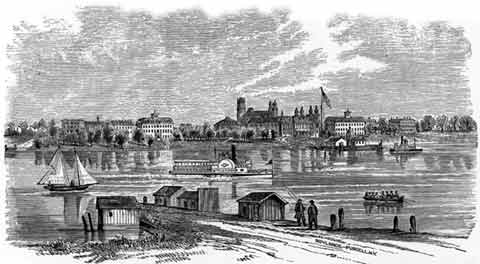|
Paul Morphy has been called "The
Pride and Sorrow of Chess" and for obvious reasons. But the
wonderment that Morphy inspired had the unfortunate effect of shadowing
out the great accomplishments and the perhaps greater tragedy of his
predecessor.
Charles Henry Stanley was born in
Brighton, England in 1819. When he was about 20, around 1840, he lived in
London where he met H.W Popert, a strong chess player from Hamburg,
Germany. Popert was just visiting London at the time, but suffered a
stroke while there. Not long afterwards, he collapsed outside of Simpson's
Divan and was transported back to Hamburg where he died in 1844. But
Stanley learned a lot about chess in that short time. He was able to hold
his own against Staunton at "pawn and 2" odds, beating him in
such a match in +3=3-1 in 1841.
some
of Popert's games
Then in 1843, Stanley moved to America. In
New York City he beat all the strongest players. But 1845 might be
accurately called the "Stanley Year."
His list of accomplishments that year is quite impressive:
- He started the first chess column in America beginning March 1, 1845
and ending October 4, 1848. It appeared in a periodical called "The
Spirit of the Times." Later, in this column he printed the first chess
problem ever published in America.
- He became secretary of the New York Chess Club.
- He won the first match ever played for a national title when he beat
Eugene Rousseau for the U.S. Championship. Though this match is
considered unofficial, there was no secret it was to determine the best
player in America. Rousseau was a French player living in New Orleans.
After he beat John William Schulten in two matches -1841 and 1843- he
was considered by the American chess community to be America's strongest
player. The stakes for the Rousseau-Stanley match was $1000. Rousseau's
second was Ernest Morphy, Paul Morphy's uncle. Paul attended too. He
would have been 6 years old. When Paul was 10, he beat Rousseau. Stanley
won the match easily and decisively with a +15-8 score.
some of Schulten's games
some of Rousseau's games
some of Stanley's games
The next year, 1846, Staney
published America's first book of a match, "Thirty-one Games at Chess."
He also founded the "American Chess Magazine" which only lasted a
year. It, along with "The Chess Palladium and Mathematical Sphinx",
were the first American chess periodicals.
In 1848, after his chess column in "The
Spirit of the Times" ended, he began a new one in "The Albion." This was
lasted until 1856. Through this chess column, Stanley met a penniless
Hungarian
refugee named Jßnos Jakab L÷wenthal. L÷wenthal was known to be a strong
European player who became a political refugee from Hungary. He came to
America hoping to become a western pioneer, but the elegantly, cultured
L÷wenthal was hardly the pioneer type. Stanley and others set him up as
chess professional in a cigar divan in Cincinnati. later L÷wenthal moved
to England and became a Bristish citizen. Before he left, he also managed
to lose to 12 year old Morphy in New Orleans.
In 1850 Stanley got married and also drew
a match with L÷wenthal (+3 -3) In 1852 he drew a match with Saint-Amant
(+4 -4).
Stanley was also a chess problemist and he helped organize and promote
America's first composing tourny in 1855.
Career wise as well as personally, everything was looking rosy for
Stanley. But he had one problem and this one problem haunted the rest of
his life. He was a seemingly incurable alcoholic.
By 1857, the year of the First American
Chess Congress, Stanley was considered the U. S. Champion but he was also
quite destitute as a result of his drinking problem. Paul Morphy won the
tournament effortlessly and after the tournament beat Stanley +4-1 in a
casual match while giving Stanley the odds of "pawn and the move."
There was no doubt that there was a new U. S. Champion. Morphy, knowing
the Stanley family's dire straits, gave his winnings to Mrs. Stanley,
claiming he couldn't give it to Charles because "he would have drunk
it all up."
Mrs. Stanley named her next child Pauline
after Paul Morphy and Charles Stanley was so impressed that he wrote and
published "Morphy's Match Games" in 1859.
In 1859, he also wrote, "The Chess Player's Instructor" which was
popular enough to go into a second printing the very same year. Then, it
was published again in 1880 but under a different title, "De Witt's
American Chess Manual."
In 1860 Stanley returned to England. There he edited a chess column in
the Manchester Weekly Express and Guardian for two
years. He tried to establish a reputation as a player in England but
failed to make any impression in either match or tournament play.
He returned to America in 1862 and after
losing a match to
George Henry
Mackenzie (+1-2), he retired from chess. From 1880 until he died in
1901, this former U.S. chess champion and innovator lived in institutions
in the Bronx and on Ward's Island State Emigrant Refuge and Hospital.

Ward's Island 1880's
|

